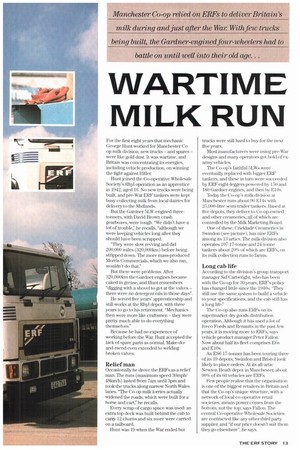WARTIME MILK RUN
Page 169

If you've noticed an error in this article please click here to report it so we can fix it.
For the first eight years that mechanic George Hunt worked for Manchester Coop milk division, new trucks and spares were like gold dust. It was wartime, and Britain was concentrating its energies, including vehicle production, on winning the fight against Hitler Hunt joined the Co-operative Wholesale Society's Idyl operation as an apprentice in 1942, aged 16. No new trucks were being built, and pre-War ERF tankers were kept busy collecting milk from local dairies for delivery to the Midlands.
But the Gardner 5LW-engined threeConners, with David Brown crash gearboxes, were tough. "We didn't have a lot of trouble," he recalls, "although we were keeping vehicles long after they should have been scrapped.
"They were slow revving and did 200,000 miles (320,000km) before being stripped down. The more mass-produced Morris Commercials, which we also ran, wouldn't do that: But there were problems. After 320,000km the Gardner engines became caked in grease, and Hunt remembers "digging with a shovel to get at the valves there were no detergent oils in those days" He served five years' apprenticeship an( I still works at the Rhyl depot, with three years to go to his retirement. "Mechanics then were more like craftsmen they were pretty much able to do everything themselves?'
Because he had no experience of working before the War, Hunt accepted the lack of spare parts as normal. Make-doand-mend even extended to welding broken valves.
Relief man
Occasionally he drove the ERFs as a relief man. The runs (maximum speed 30mph/ 481cm/h) lasted from 7am until 3pm and took the trucks along narrow North Wales lanes. "The Co-op milk lorries actually widened the roads, which were built for a horse and cart; he recalls.
Every scrap of cargo space was used: an extra top deck was built behind the cab to carry 12 churns and six more were carried on a tailboard.
Hunt was 19 when the War ended but trucks were still hard to buy for the next five years.
Most manufacturers were using pre-War designs and many operators got 15)1(1 of exarmy vehicles.
The Co-op's faithful 5LWs were eventually replaced with bigger ERF tankers, and these in turn were succeeded by ERF eight-leggers powered by 15i/ and 180 Gardner engines, and then by ElOs.
Today the Co-op's milk division at Manchester runs about 90 E14s with 25,000-litre semi-trailer tankers. Based at five depots, they deliver to Co-op-owned and other creameries, all of which are controlled by the Milk Marketing Board.
One of these, Cricklade Creameries in Swindon (see picture), has nine ERFs among its 13 artics. The milk division also operates 107 17-tonne and 24-tonne tankers about 20% of which are ERFs, on its milk collection runs to farms.
Long cab life
According to the division's group transport manager Sid Cartwright, who has been with the Co-op for 30 years, ERFs policy has changed little since the 1940s. "They still use the same system to build a vehicle to your specifications, and the cab still has a long life."
The Co-op aLso runs ERFs on its supermarket dry goods distribution operation. Although it has used a lot of Iveco Fords and Renaults in the past few years, it is moving more to ERFs, says vehicle product manager Peter Fallon. Now about half its fleet comprises E6s and ElOs.
An ES6 17-tonner has been touring three of its 19 depots; Swindon and Bristol look likely to place orders. AL its all-artic Newton Heath depot in Manchester; about 90% of its 60 vehicles are ERFs.
Few people realise that the organisation is one of the biggest retailers in Britain and that the Co-op's unique structure, with a network of local co-operative retail societies, means power comes from the bottom, not the top, says Fallon. The central Co-operative Wholesale Societies are contracted like any other third party supplier, and if our price doesn't suit them they go elsewhere", he says.




































































































































































































